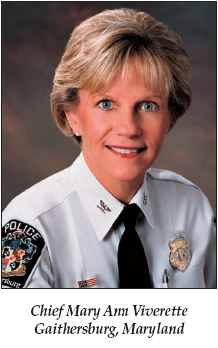 For more than 112 years, the IACP has been a leader in the law enforcement community in the United States and around the world. Our association has often been on the cutting edge of the policing profession, fostering cooperation among law enforcement agencies, researching new technologies, and developing new training protocols and procedures.
For more than 112 years, the IACP has been a leader in the law enforcement community in the United States and around the world. Our association has often been on the cutting edge of the policing profession, fostering cooperation among law enforcement agencies, researching new technologies, and developing new training protocols and procedures.
The IACP’s ability to function at this high level is due, in large part, to the guidance and structure provided to the leadership and staff through the IACP Constitution and Rules. This vital document forms the backbone of our association, and sets forth the general philosophies of the IACP and the specific rules that govern its operations.
One reason that the constitution and rules play such a central role in the IACP’s success is that they have been frequently subjected to a thorough examination in order to ensure that they remain clear and consistent with the desires of the membership.
The last comprehensive review of the IACP Constitution and Rules took place in 2001, during the presidency of Bruce Glasscock. As a result of that review, which focused primarily on the nine articles of the constitution, the membership had the opportunity to vote on 10 proposed amendments at the annual IACP conference in Toronto.
This year, I have asked IACP Parliamentarian Ed Mosca, chief of police in Old Saybrook, Connecticut, to lead a comprehensive review of the 35 rules that not only govern the day-today business operations but also dictate the function and structure of the association’s various committees, sections, and divisions.
Joining Chief Mosca in this task are the other members of the IACP Constitution and Rules Committee.
- Colonel Carl Baker, Chesterfield County, Virginia, Police Department
- Chief Michael Carroll, IACP fourth vice president, West Goshen Township, Pennsylvania, Police Department
- Chief John M. Clark, Burlington Northern Santa Fe Railroad Police Department, Fort Worth, Texas
- Tom Driessen, IACP international vice president, director, National Crime Squad of the Dutch Police
- Chief Russell Laine, IACP third vice president, Algonquin, Illinois, Police Department
- Chief Leslie Sharrock, Waukesha, Wisconsin, Police Department
- Chief Craig Steckler, IACP vice president at large, Fremont, California, Police Department
- Chief David G. Walchak (retired), IACP past president, New Braunfels, Texas
- Chief Stephen White, Doylestown Township, Pennsylvania, Police Department
- Chief Carl Wolf, IACP vice president – treasurer, Hazelwood, Missouri, Police Department
- Chief Jimmy Fawcett, IACP fifth vice president, Farmers Branch, Texas, Police Department
These individuals have been selected for this committee because of their long association with the IACP, their exposure to its operating principles, and their dedication to ensuring its future success. The committee is a strong team, and our combined efforts over the next several months will provide the association with a solid and dependable review of the IACP Constitution and Rules.
It is important to note that this process has not been undertaken to overhaul the IACP Constitution but to improve the processes by which the membership and the association conduct business. Both substantive and non- substantive changes will be considered. Reviewing all items will help to guarantee that sound, contemporary, meaningful operations are at work, without impediments, in support of our association’s expanding goals.
The committee’s first meeting, held in mid-January, included reviewing and discussing the committee’s mission, constitution, and amendment requirements and organizing and assigning tasks to committee members. Over the next several months, the committee will be working closely with IACP staff and the association’s many divisions, sections, and committees to solicit their input and recommendations for changes to the rules that govern their operations.
It is critical that the general membership also play a role in this vital review process. As the preamble to the IACP Constitution makes clear, the ultimate authority in the IACP is its membership. As the review process continues, the views and suggestions of the membership are important, and I strongly urge you to participate in the review and revision of the association’s governing document.
To help you in this regard, the constitution may be accessed through the IACP’s Web site at (www.theiacp.org). We have also set up a special e-mail address where you may send IACP your suggestions and comments: (constitution@theiacp.org).
Our association and policing have changed considerably since IACP was founded as a national organization in 1893. We now represent more than 20,000 members in 102 countries, and our steady growth continues. IACP is your association, and we want to hear your voice as we chart our course for the future. You are invited and encouraged to participate in this historical endeavor.


